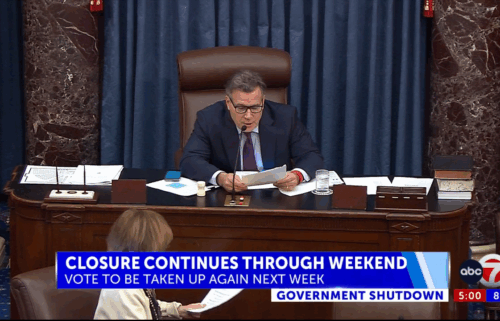Barr’s stunning Trump rebuke sparks debate over his true motives

William Barr’s sharp public rebuke of Donald Trump’s legal meddling was an astonishingly rare show of dissent from a top Cabinet chieftain — but the attorney general’s record as the President’s protector suggests there may be more to the latest Washington mystery than first meets the eye.
Barr’s blunt warning that Trump’s constant Twitter commentary makes it impossible to do his job broke like a thunderclap Thursday afternoon. It set off a deluge of speculation about his motives and potential reprisals from a President who brooks no disloyalty.
On the face of it, Barr’s comments in an ABC News interview look like a daring assertion of independence amid the storm over Trump’s intervention in the sentencing process for his political trickster Roger Stone.
If that was the case, Barr took a significant risk in his interview: Top officials who rebuke the President — such as ex-Attorney General Jeff Sessions — face a painful glide path to the sack. Most Cabinet officials — such as former chief of staff John Kelly, who is currently on an anti-Trump tear — wait until they are back in private life to speak up. And if Barr says he can’t do his job while Trump tweets, there will be questions about how long can he stay in office, since the President is not going to suddenly quit his favorite method of stirring up his supporters.
Barr’s true motives may take days to become clear. His inscrutable style and record of watching Trump’s back also have many observers suggesting ulterior political motives, a desire to slake some of the pressure bearing down on his department or an effort to at least restore the impression of the Justice Department’s independence without severing ties with Trump.
Perhaps Barr was acting to protect his own reputation, amid furious criticism of his conduct as the President’s shield. Or was he trying to head off a mutiny in his department? CNN reported on Wednesday that more prosecutors were considering walking out on the Justice Department amid fears for its independence after four lawyers had already quit the Stone case.
Trump had a general idea of Barr’s views about his tweets ahead of his interview on ABC, and was aware Barr could raise them in the sit-down, according to a person familiar with the matter. But the interview still surprised some White House officials, who recognized the potential for Trump to view Barr’s comments as a rebuke, the person said.
The White House said Trump wasn’t bothered by the comments. But he publicly rejected Barr’s criticism by returning to tweeting about the Justice Department on Friday morning.
Barr’s comments are being viewed among some officials as a sign of his high standing with the President. Few other Cabinet officials would feel comfortable issuing public criticism of the President; however calculated Barr’s critique may have been, it was still a brush-back.
A coordinated damage-control mission would not be impossible, since more than anyone in the administration, Barr may have leeway to buy some political capital, after basking in Trump’s praise for a string of decisions that appeared to protect the President.
Responding to Barr’s claim in the ABC interview that Trump has never asked him to “do anything” in a criminal case, Trump tweeted Friday, “This doesn’t mean that I do not have, as President, the legal right to do so, I do, but I have so far chosen not to!”
But even if Barr remains in good favor, it’s unclear how the President will react. Often Trump stews after the fact about media coverage of his dramas for days. The tenure of Cabinet officials can be short and brutal. If Trump does eventually lash out at Barr, it wouldn’t be the first time a favorite has blotted his copybook and undermined an apparently impregnable position after falling out with an often-impossible boss who resists any constraints on his conduct and often seems to sabotage his own political interests.
Shocking public criticism
While there is a growing parade of Trump aides publicly criticizing the President’s temperament and behavior once they leave office, few have been so public as Barr was Thursday in faulting the President’s tweeted rhetoric.
That must at least raise the possibility that this may have been the moment — amid a backlash against Trump’s post-impeachment power grabs — that Barr’s concern for his own reputation began to outweigh his deference to a President tearing at basic judicial norms.
And was it also the day that the first cracks emerged in the relationship between Trump and the attorney general and protector, the Bobby Kennedy or Eric Holder he’s always longed for?
Trump has a highly developed sense that subordinates — even those who owe allegiance first to the Constitution and an independent duty to impartial justice — owe him deep personal loyalty. The failure to carve out such a relationship of patronage was an early reason he began to sour on fired FBI Director James Comey.
Barr said in the interview Thursday that he would not be “bullied or influenced by anybody … whether it’s Congress, a newspaper editorial board, or the President.”
“I’m going to do what I think is right. And you know … I cannot do my job here at the department with a constant background commentary that undercuts me,” he said.
A cynic might argue that Barr’s remarks could be read as a dressing down of media and legal commentators who have savaged him as a tame enabler of an unbridled President as much as they are directed at Trump himself. He seems to be taking exception to the idea that public criticism could change what he regards as his principled approach.
One clue that Barr’s critique of Trump may not be an act of complete insubordination is suggested in the substance of his comments about the Stone case. The attorney general said he had always planned to reduce the department’s sentencing recommendation of up to nine years in jail for Stone, Trump’s longtime political fixer, implying that Trump’s tweet made that step more controversial.
Trump’s protector
Given his past record, there’s reason to believe that one transgression will not cause Trump to spurn Barr.
The attorney general took heat for spiking the most damaging revelations from the Mueller report for the President — and he’s an advocate for the kind of sweeping presidential power that Trump prizes. He agreed to the President’s demands for a probe into the origins of the Russia investigation. On Wednesday, Trump praised Barr for intervening in the Stone case — outraging critics who saw the President’s previous pressure as staining a tradition of an impartial court system.
So it seems a little farfetched to think that Barr has suddenly snapped because of a philosophical and ideological break with Trump.
Another clue to Barr’s motives may lie in the tepid initial White House reaction to his comments.
“The President wasn’t bothered by the comments at all and he has the right, just like any American citizen, to publicly offer his opinions,” White House spokeswoman Stephanie Grisham said in a statement. “The President has full faith and confidence in Attorney General Barr to do his job and uphold the law.”
Trump can hardly afford to lose another attorney general. He is also unlikely to find one who has been as keen to look after his political and legal interests as Barr. So even if the President is angry about the comments, his options may be limited.
Suggestions that the interview was a choreographed attempt to ease pressure on Justice will be supported by a statement put out within minutes of the interview by Senate Republican Judiciary Chairman Lindsey Graham — another Trump protector — that read like an attempt to give the nation’s top law enforcement official political cover from any presidential explosion.
“President Trump, in selecting Bill Barr to be attorney general, has done a great service to the people serving in the Department of Justice and our nation as a whole,” the South Carolina Republican said.
“He is the right man at the right time to reform the Department and stand up for the Rule of Law. Attorney General Barr has my complete confidence,” Graham said.
Still, the thinness of the President’s skin is legendary, so Barr is not safe yet.
Barr’s Washington mystery
David Urban, who mastermind Trump’s win in Pennsylvania in 2016, told CNN that he thought the attorney general was not telling Trump to back off but to make his own position easier.
“‘You don’t need to tweet and tell me what to do, I have your back,’ ” Urban said, paraphrasing Barr’s possible thought process.
But Jim Baker, the former general counsel at the FBI, said Barr’s comments raise questions about his position.
“This is the Bill Barr I’m familiar with. This is sort of the strong, independent leader, person of integrity and intelligence, and speaking out loudly for his troops,” Baker told CNN’s Wolf Blitzer.
Baker said Barr likely had no choice but to speak out to stave off an internal rebellion at the department.
“The second thing: It sounds like it’s a resignation letter. It sounds forceful. … I can no longer do my job. That’s what you say when you decide to walk out the door,” he said.
Democratic Rep. John Garamendi of California took Barr’s remarks at face value, though he bemoaned that the attorney general had not spoke out before.
“It’s extremely important. We have seen school grounds where bullies push people around. Then he finally pushes too far. Clearly, the President pushed Barr too far. Unfortunately, I think, for this nation, it’s been late in the process for Barr to stand up to the President and say, ‘You can’t do this. This is wrong.’ “
But another senior Democrat, Rep. David Cicilline of Rhode Island, told Blitzer that “it’s very important to question the sincerity of the attorney general.”
“I think that’s why the President’s response was so muted. This is from an attorney general who from the day he arrived in office has behaved as the President’s defender, who thinks that his role is to defend the President of the United States, not to represent the people,” he said.



